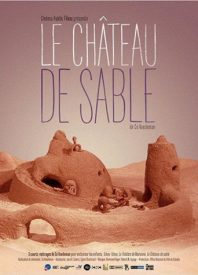
Norman McLaren, Chris Landreth, and Co Hoedeman headline OVID’s collection of Oscar-winning animated shorts, specifically Canadian ones. McLaren is the outlier here for reasons I’ll explain later. But the seven short films in the collection cover two eras when Canadian animation directors, especially those working for and with the NFB, dominated the Academy Awards. Canadian animators used different media and at least the three animators above tackle what it’s like to build and destroy thing.
I actually want to begin with the shorts that I’ve seen before, the first being Torill Kove’s The Danish Poet, where Liv Ullmann tells the story of how a narrator without a name met his parents. I probably saw this at the same time that Kove’s other short Me and My Moulton came out, which I didn’t like. Poet is much better though, with its pastel colours and simple lines. Ullmann’s narration is also a treat here. There’s just something about the way she pronounces vowels that remind me of the characters she played in Bergman’s films, a note she plays to evoke young love. How I Met Your Mother could never. The longest of the collection yet every second is worth it.
From Denmark we move back to Canada with McLaren’s Neighbours. It’s about two neighbours (Grant Munro and Jean Paul Ladouceur) who notice a flower growing between their lawns so both fight over it. Now I have the time to explain why McLaren is the outlier, since this is the earliest short in the collection, it uses actors and captures them in stop motion. And this is the only short that only got a nomination and not a win. In fairness, this came out when Walt Disney dominated the live action short category. The metaphor is, well, a metaphor. But it’s the most popular short in the collection because the conflict it symbolizes when it came out still applies today. Makes sense that I sough it out last year. I also see through lines between this work and late 20th century British humour.
David Fine and Alison Snowden’s Bob’s Birthday is the first of the collection that I haven’t seen yet, although it seems familiar. That’s because when I researched it, this was the inspiration for the Bob and Margaret series. That show aired on Global more than twenty years ago. Anyway, this came out and eked a win between the Nick Park era. This short has similarities with Park’s themes of middle aged British people having existential crises. This specific short is about Margaret (Snowden’s voice) planning a surprise party for her husband (Fine), the titular character, for his 40th. But of course Bob doesn’t behave like she wants to. Unlike Park, this is 2d and the colours and more subtle. And 12 minutes is enough to make me curious about the show. Lastly, I think what hits me here is that I have a substitute teacher just like Margaret.
I bring up eras because there was the first NFB era, which was during the late 1970s when NFB shorts won back to back to back. The one that won 1979 was Every Child. It shows different sets of adults notice that their lives are too busy so they pass a baby around to the next house, and so it goes. The muted colours are present here too but the lines are too janky. The plot is simple enough I guess but it seems like it needs a context. My least favourite of the bunch but I still like it. The collection’s shortest.
The next Oscar winner I’m writing about is Chris Landreth’s Ryan, where Landreth reimagines himself in animation form and visits his hero. That hero is the titular animator, Ryan Larkin. Larkin went from fellow Oscar nominee in the 1970s to hanging out in soup kitchens in Montreal’s skid row. This will probably hit creative types in a different way, recognizing a part of themselves in Ryan, a cautionary tale. It also uses 21st century tech in inventive ways, capturing its broken subjects. Landreth uses Larkin’s voice, an element that makes the short the best and most haunting in the collection.
For the next short, we go back to the 70s with Hoedeman’s The Sand Castle. At first, the short worried me because I thought there was going to be no plot. But it subtly unfolds, depicting sand creatures of different shapes building unique structures within the titular castle. I like the message here for the most part, that different creatures are smart and contribute in their own way. Of course, most of the creatures demonize the snake. This probably reflects how the real world might never recognize some creatures fore their assets. This is simple in a good way and has a heartbreaking ending.
Lastly, Eunice Macaulay and John Weldon’s Special Delivery tackles the macabre. It’s about how a couple’s life changes after a husband decides not to shovel his steps. I would have liked to see a version of this with less or none of Sandy Sanderson’s narration. Watching this made me realize just how much penis there is in this collection. This makes sense because of the subject matter it eventually touches on. The colours are light, which, duh, offsets the dark themes. Even the childlike use of the colour adds dimension and movement to it, which is probably why it also won an Oscar.


